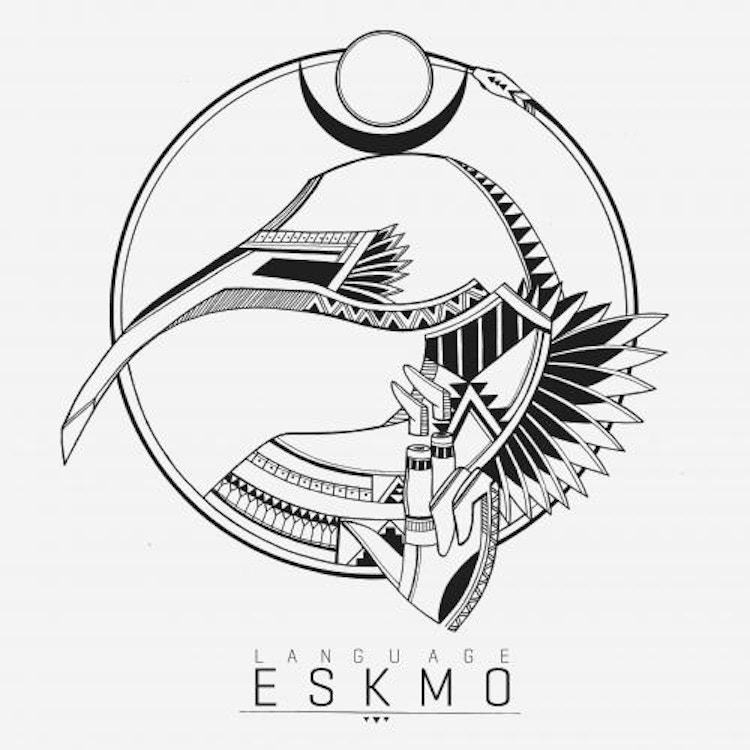"Language"

Glitchy, moody, temperamental and highly caffeinated, these are the realms in which Brendan Angelides, otherwise known as Eskmo, exists. His latest five song EP titled Language moves back and forth from his dubstep tendencies to standard rhythms with unconventional interruptions. By no means formulaic, Language sets up its own rules only to break them seconds later. The result is a restless but captivating affair, full of musical metaphors that would more typically thrive in a cold and grimy environment, rather than Eskmo’s warm and sunny home city of San Francisco.
Even ‘I Just Want’, a track that revels in creamy, warm synth nodes, swims amidst an undercurrent of uncertainty. If it wasn’t for the odd bits and pieces of vocal samples that act more like instruments with life spans shorter than the average tick on a clock, the track would actually sound like your typical club mood builder, until Eskmo sweeps in like a jet engine, leaving behind a minimal, ambient spotlight on the vocals. I might be dating myself here, but the effect is similar to that awkward moment during a high school dance’s final song – say, Stairway to Heaven – when you’re not sure if and how to dance, or whether it be better to head for the washrooms and reclaim any unused beverages mischievously snuck in and happily chilling in the toilet tanks. But Language is not best enjoyed as a dance record. Rather it is musical journey, a passport to different electronic states all tightly condensed into 20 minutes. For the over-stimulated, it might serve as a beacon. For the rest of us, Language makes us yearn for our Four Tet records.
In 1996, the persons responsible for working the DJ consoles in many high school dances kept giving life to those awkward final moments by playing un-danceable songs. Around the same time, dubstep was but a twinkle in the eye from the fathers of the genre. Language‘s lead track, aptly titled ‘1996’, is perhaps a tribute to those times where house music continued to be dissected into several different sub forms, eventually leading to the experimental bass lines and twitchy motifs of dubstep. While ‘1996’ has some traditional elements of the genre, like the rest of the album, it does not rest in any given area for too long. It is a fitting opener for a record that prides itself on having an identity crisis.
‘Lifeline’, like many of the songs on Language, makes use of a digitised vocoder effect rendering the vocals incomprehensible. It’s an overused technique in electronic music and the result often detracts from the quality production that exists underneath. The song itself follows a contagious rhythmic flow for most of its duration with more of a true dubstep feel. ‘Oh In This World of Dread, Carry On’ carries us into the post-dubstep world with lighter and tighter arrangements that feel as if they are trying to break the chains that shackled the songs before. It is without a doubt the highlight of the record conveying a feeling that any kind of adversity can be overcome. The final track accomplishes a little warmth and intimacy, qualities that are very rare amidst electronic blips and beeps. Perhaps the subtle sounds of rain falling in the background serves to connect with nature while ethereal synths build into a crescendo of sound. Clocked at 4:17, the song is not long enough for the effect to truly make an impact. Subsequently, neither is the album.
Eskmo is not your average fire-up-the-old-laptop-and-paste-some-prepackaged-beats-together sort of thing. Given Brendan Angelides’ penchant for stage names (he also produces a more subdued form of music under the name Welder), it is safe to suggest that Eskmo is less a person and more a state of mind. On Langauge, he reminds us be open to anything and alert for everything at all times.
Listen to Language
Get the Best Fit take on the week in music direct to your inbox every Friday

Emma-Jean Thackray
Weirdo

Viagra Boys
viagr aboys

William Tyler
Time Indefinite





